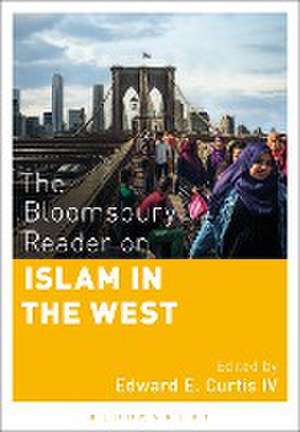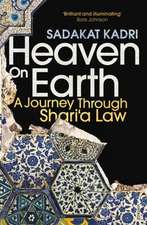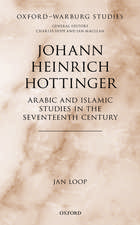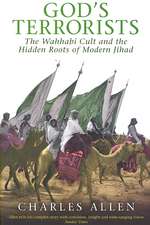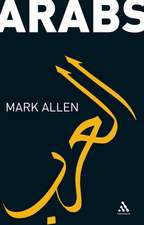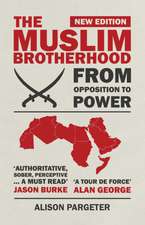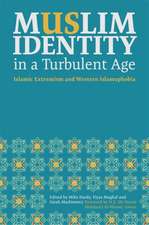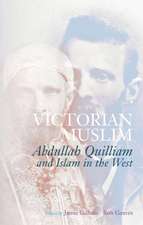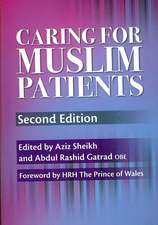The Bloomsbury Reader on Islam in the West
Editat de Edward E. Curtis, IVen Limba Engleză Paperback – 21 oct 2015
| Toate formatele și edițiile | Preț | Express |
|---|---|---|
| Paperback (1) | 228.24 lei 3-5 săpt. | |
| Bloomsbury Publishing – 21 oct 2015 | 228.24 lei 3-5 săpt. | |
| Hardback (1) | 893.55 lei 6-8 săpt. | |
| Bloomsbury Publishing – 21 oct 2015 | 893.55 lei 6-8 săpt. |
Preț: 228.24 lei
Preț vechi: 278.21 lei
-18% Nou
Puncte Express: 342
Preț estimativ în valută:
43.69€ • 47.47$ • 36.72£
43.69€ • 47.47$ • 36.72£
Carte disponibilă
Livrare economică 31 martie-14 aprilie
Preluare comenzi: 021 569.72.76
Specificații
ISBN-13: 9781474245371
ISBN-10: 1474245374
Pagini: 304
Dimensiuni: 169 x 244 x 18 mm
Greutate: 0.54 kg
Editura: Bloomsbury Publishing
Colecția Bloomsbury Academic
Locul publicării:London, United Kingdom
ISBN-10: 1474245374
Pagini: 304
Dimensiuni: 169 x 244 x 18 mm
Greutate: 0.54 kg
Editura: Bloomsbury Publishing
Colecția Bloomsbury Academic
Locul publicării:London, United Kingdom
Caracteristici
Suitable for both specialist and non-specialist instructors and students, the volume includes an extensive introduction, contextualizes each author and extract, and provides a chronology of key events
Notă biografică
Edward E. Curtis IV is Millennium Chair of the Liberal Arts & Professor of Religious Studies at the Indiana University School of Liberal Arts in Indianapolis, Indiana, USA. He is the author or editor of several books about Islam, American religions, and Africana studies, including The Columbia Sourcebook of Muslims in the United States (2009) and Muslims in America: A Short History (2009). Curtis is the recipient of Carnegie, Fulbright, Mellon, and National Endowment for the Humanities fellowships.
Cuprins
AcknowledgmentsChronologyIntroductionPART ONE: Islam in Western History1. Muslims in the Making of the West(I) Brian Catlos, "The Caliphate in the West" (2014)(II) María Rosa Menocal, The Arabic Role in Medieval Literary History (2011)(III) David W. Tschanz, "The Arab Roots of European Medicine" (1997)(IV) Christine Isom-Verhaaren, Allies with the Infidel (2013)(v) R. Brooks Jeffery, "The Islamic Legacy in the Built Environment of Hispano-America" (2003)2. Muslims in the Modern West(I) Edward E. Curtis IV, "Why Muslims Matter to American Religious History, 1730-1945" (2012)(II) Ian Almond, "The Crimean War (1853-6): Muslims on All Sides" (2009)(III) Jamie Gilham, "Britain's First Muslim Peer of the Realm: Henry, Lord Stanley and Islam in Victorian Britain" (2013)(IV) Nathalie Clayer, "Transnational Connections and the Building of an Albanian and European Islam in Interwar Albania" (2014)3. Western Muslims in the Late Twentieth Century(I) Saladin Ambar, "The Din of Malcolm: Projections of Islam in France and the United Kingdom, 1964-1965" (2015)(II) Kathleen M. Moore, "U.S. Muslims in Prison: Constitutional Protection of Religious Liberty" (1995)(III) Kambiz GhaneaBassiri, "American Muslim Activism Following the Soviet Invasion of Afghanistan" (2010)(IV) Jørgen Nielsen, "European Muslims in a New Europe?" (2004)PART TWO: Islam in the Contemporary West4. Practicing Islamic Religion in the West(I) Vernon James Schubel, "Karbala as Sacred Space among North American Shi'a: 'Every Day Is Ashura, Everywhere Is Karbala'" (1996)(II) Johan Fischer, "Halal, Haram, or What? Creating Muslim Space in London" (2009) (III) Michelle C. Johnson, "'The Proof Is on my Palm': Debating Ethnicity, Islam, and Ritual in a New African Diaspora" (2006)(IV) Julianne Hazen, "Conversion Narratives among the Alami and Rifa'i Tariqa in Britain" (2014)5. Islam, Muslim Women, and Gender(I) Asma Barlas, "Qur'anic Hermeneutics and Women's Liberation" (2005) (II) Asifa Quraishi-Landes, "Rumors of the Sharia Threat Are Greatly Exaggerated: What American Judges Really Do with Islamic Family Law in the Their Courtrooms" (2013)(III) Annelies Moors, "'Islamic Fashion' in Europe: Religious Conviction, Aesthetic Style, and Creative Consumption" (2009)(IV) Edward E. Curtis IV, "Transnational Muslim Americans: Three Women in Jordan" (2013)6. Muslim Citizenship, Belonging, and Dissent in the West(I) Zareena Grewal, "Lights, Camera, Suspension: Freezing the Frame on the Mahmoud Abdul-Rauf Anthem Controversy" (2007)(II) John R. Bowen, "Does French Islam Have Borders? Dilemmas of Domestication in a Global Religious Field" (2004)(III) Basheer M. Nafi, "Fatwa and War: On the Allegiance of the American Muslims Soldiers in the Aftermath of September 11" (2004)(IV) Riem Spielhaus, "Religion and Identity: How Germany's Foreigners Have Become Muslims" (2006)(V) Mieke van Dijk and Edien Bartels, "'European Islam' in Practice-in the Bosnian City of Sarajevo" (2012)7. Muslim Music, TV, and Comedy in the Age of Terror(I) Hisham Aidi, "'Let Us Be Moors': Islam, Race, and Connected Histories" (2003) (II) Amir Hussain, "(Re)presenting: Muslims on North American Television" (2010)(III) Amarnath Amarasingam, "Laughter the Best Medicine: Muslim Comedians and Social Criticism in Post-9/11 America" (2010)Index
Recenzii
Via histories and contemporary case studies, Curtis weaves together a cohesive narrative that shows the ways in which the categories of 'Islam' and 'the West' are entwined together into a complex tapestry over time. In the end, this is a valuable collection that brings into dialogue a stunning set of scholars and yet exhibits the touch of a talented editor who makes a singular story emerge from the sundry texts included.
This superb reader documents how Muslims were an integral part of the history of the West, and how they continue to shape its present forms. One hopes that it is read widely, especially by those who doubt the influence that Muslims had and continue to have on what it means to be "Western".
Here is a magnificent collection on Islam in the West, superbly edited by Edward Curtis. There is remarkable geographic diversity that takes us from North America and Europe to Russia and Spain to Africa. There is rich gendered analysis and discursive diversity. The range of scholars brought together in this accessible reader is simply stunning. Ideal for classroom usage; recommended to both scholars and general readers.
With The Bloomsbury Reader on Islam in the West, editor Edward E. Curtis IV has provided students interested in the exchanges between the 'West' and 'Islam' with an invaluable point of reference that goes to fill an important void. The volume is coherently organised, its introduction questions key terms, and readers are introduced to the chapters with a useful description of each contribution.
The Bloomsbury Reader on Islam in the West eschews the prevailing narratives of westernization that presume Islam is a foreign tradition in Europe and North America. Through histories and contemporary case studies, readers will learn about the ways in which the taken-for-granted categories of Islam and the West are neither opposite nor separate but overlapping, fluid, contested, and even co-constituted.
In this eclectic volume, Edward Curtis demonstrates yet again his superior command of the academic study of Muslims in and as part of "the West" and his ability to tell a convincing story at the same time. His is a story, told through excerpts from academic publications, of historical trajectories, diversities of practice, and contexts in which Muslims live(d), produce(d) meaning, and are/were perceived and treated in a variety of ways. A very valuable collection indeed.
An excellent and timely volume with a very broad scope of inclusion.
This superb reader documents how Muslims were an integral part of the history of the West, and how they continue to shape its present forms. One hopes that it is read widely, especially by those who doubt the influence that Muslims had and continue to have on what it means to be "Western".
Here is a magnificent collection on Islam in the West, superbly edited by Edward Curtis. There is remarkable geographic diversity that takes us from North America and Europe to Russia and Spain to Africa. There is rich gendered analysis and discursive diversity. The range of scholars brought together in this accessible reader is simply stunning. Ideal for classroom usage; recommended to both scholars and general readers.
With The Bloomsbury Reader on Islam in the West, editor Edward E. Curtis IV has provided students interested in the exchanges between the 'West' and 'Islam' with an invaluable point of reference that goes to fill an important void. The volume is coherently organised, its introduction questions key terms, and readers are introduced to the chapters with a useful description of each contribution.
The Bloomsbury Reader on Islam in the West eschews the prevailing narratives of westernization that presume Islam is a foreign tradition in Europe and North America. Through histories and contemporary case studies, readers will learn about the ways in which the taken-for-granted categories of Islam and the West are neither opposite nor separate but overlapping, fluid, contested, and even co-constituted.
In this eclectic volume, Edward Curtis demonstrates yet again his superior command of the academic study of Muslims in and as part of "the West" and his ability to tell a convincing story at the same time. His is a story, told through excerpts from academic publications, of historical trajectories, diversities of practice, and contexts in which Muslims live(d), produce(d) meaning, and are/were perceived and treated in a variety of ways. A very valuable collection indeed.
An excellent and timely volume with a very broad scope of inclusion.
